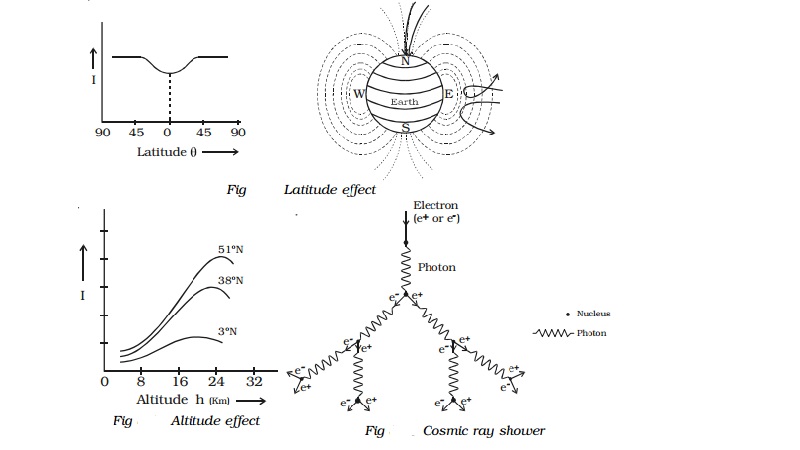Chapter: 11th 12th std standard Class Physics sciense Higher secondary school College Notes
Cosmic Rays: Latitude effect, Altitude effect, Cosmic ray showers

Cosmic Rays
The study of cosmic rays started with gold leaf
electroscope experiment. It was found that if a properly insulated and charged
gold leaf electroscope is left to itself, the charge leaks gradually, which
happened in all the places on the land, mines and sea. Ionising radiation
coming from the outer space is the reason for leakage of charges. The ionising
radiation many times stronger than γ-rays entering the earth from all the directions from cosmic or
interstellar space is known as cosmic rays. The name, cosmic rays was given by
Millikan.
The cosmic rays can be broadly classified into
primary and secondary cosmic rays. The primary cosmic rays are those coming
from outer space and enter the outer boundary of the earth's atmosphere. The
primary cosmic rays consist of 90% protons, 9% helium nuclei and remaining
heavy nuclei. The energy of the primary cosmic rays is of the order 108
MeV.
The secondary cosmic rays are produced when
primary cosmic rays interact with gases in the upper layers of the atmosphere.
They are made up of particles like α-particles, protons, electrons, positrons, mesons, photons, etc. in
different proportions.
Latitude effect
The experiments to study the variation of
cosmic ray intensity (I) with geomagnetic latitude (θ) showed that the intensity is maximum at the poles (θ
= 900), minimum at the equator (θ = 0) and constant between latitudes of 420 and 900.
The variation of cosmic ray intensity with geomagnetic latitude is known as
latitude effect and is shown in Fig.
The decrease in cosmic ray intensity at the
earth's equator is explained to be due to the earth's magnetic field. The
charged particles approaching the earth near the poles travel almost along the
direction of the magnetic lines of force. They experience no force and easily
reach the surface of the earth and hence maximum intensity at poles. But the
charged particles that approach at the equator have to travel in a
perpendicular direction to the field and are deflected away. Only particles
with sufficient energy can reach the equator, while the slow particles are
deflected back into cosmos and hence minimum intensity at the equator.
Altitude effect
The study of variation of cosmic ray intensity
(I) with altitude
(h) is known as altitude
effect, which is represented in Fig 8.12. It is seen that I the
intensity increases with
altitude and reaches a maximum at a height of about 20 km. Above this
height there is a fall in intensity. The experimental results are similar at
different places of the earth.
Cosmic ray showers
When a detecting device is used to study cosmic
ray intensities, it is observed that the intensity rises momentarily to several
times its normal value, which indicates sudden burst of radiation.
The cascade theory of cosmic ray shower shows
that the shower production involves two processes, radiative collision and pair
production (Fig. 8.13). An energetic electron or positron present in cosmic
rays loses energy, when it collides with the nuclei of atoms in earth's
atmosphere. This energy loss appears as high energy photon. This photon
interacts with an atomic nucleus and produce an electron position pair. The
electron and positron, so produced have sufficient energies to produce more
photons on interaction with nuclei, which are further capable of bringing about
pair production. The result is the generation of a large number of photons,
electrons and positrons having a common origin like a shower and hence it is
known as cosmic ray shower. Themul-tiplication will continue until the Initial energy becomesdivided and the individual Energy
of the particles fall below the 'critical energy' when Photon emission and pair produc-tion can no longer occur.
Pair production and annihilation of matter
The conversion of a photon into an electron−positron pair on its interaction with the strong electric field
surrounding a nucleus is called pair production.
The converse of pair production in which an
electron and positron combine to produce a photon is known as annihilation of
matter.
Related Topics